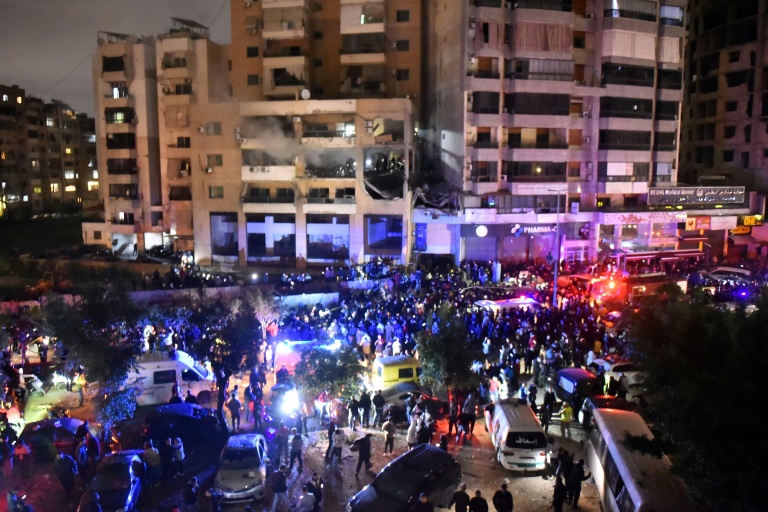The Montreal-based group was founded in 2004 by Thomas Woodley and his wife, Grace Batchoun, against the backdrop of the Second Intifada
Article content
The founder of Canadians for Justice and Peace in the Middle East, a prominent anti-Israel group in Canada, resigned from his post in late December, citing ongoing opposition to his leadership “as a non-Palestinian” among activists.
In a lengthy goodbye email to supporters, founder and president Thomas Woodley says that since the October 7 Hamas attacks on Israel, the anti-Israel activist movement has come to see Canadians for Justice and Peace in the Middle East (CJPME) as illegitimate because of its non-Palestinian leadership.
Advertisement 2
Article content
“Even though CJPME was founded as an organization for ‘Canadians of all backgrounds,’ we are now viewed through a lens of identity politics by many. Even though CJPME has never claimed to be ‘Palestinian’ or to ‘speak for Palestinians,’ many in the movement presume that non-Palestinians in leadership at CJPME are illegitimate,” Woodley wrote. “I’ve been ready to leave CJPME for some time, and these new winds indicated to me that the time had finally come.”
When Woodley and his wife, Grace Batchoun, founded the group in Montreal in 2004 against the backdrop of the Second Intifada, they did so, Woodley said, because of the exclusionary views of the local activist community.
“We never intended to start an organization, but when the local Palestinian community organization said that they could accept my wife as a member, but not me (as a non-Palestinian), we realized that we wanted to build an organization that welcomed ALL Canadians,” Woodley wrote.
Article content
Advertisement 3
Article content
The group confirmed to the Post in a written statement Tuesday that Woodley “resigned after a long and successful tenure” but appeared to dispute his allegations that his status “as a non-Palestinian” was an advocacy obstacle.
“CJPME is a diverse board and staff — comprising people from all walks of life, both Palestinian and non-Palestinian. Our mission is to enable Canadians of all backgrounds to promote justice, development and peace in the Middle East, and here at home in Canada,” the board’s statement said.
The group announced vice-president Michael Bueckert had been named interim president of CJPME and the CJPME Foundation.
Woodley did not reply to the Post’s request for comment.
However, Woodley’s resignation reflects tension within the activist community that has existed for some time. Ghada Sasa, a former CJPME board member suspended shortly after the October 7 atrocities for arguing that Nova music festival concertgoers were killed by Israeli forces and not Palestinian terrorists, denounced the group — naming Woodley and Bueckert specifically — after she was suspended.
Advertisement 4
Article content
“This organization, which is led by two white men presents itself as the largest Palestine solidarity group in ‘Canada’ while silencing & punishing dissenting Palestinian voices,” Sasa wrote. “My experience as a Board member exposed @CJPME & other ‘non-profits’ as highly oppressive groups behind their benevolent facade. Shame on the cowardice & complacency of CJPME board members.”
Sasa, who holds a social science doctorate from McMaster University, had done an interview with Alberta talk show host Ryan Jespersen in which she said she “was reading a lot of the people who were killed were actually killed by Israel.”
“Hamas was not trying to kill (Israelis),” she continued.
Advertisement 5
Article content
In response, CJPME released a statement that said, “Ms. Sasa has never been authorized to speak on behalf of the organization. In addition, some views that Ms. Sasa has expressed publicly are not aligned with the policies and positions of the organization.”
The question of who has the right to speak as a member of an activist community has long plagued advocacy groups.
British artist Tanushka Marah has written about how advocating for Arabs and Muslims during the War on Terror became popular for many progressives.
“In the years after 9/11, people became dimly aware that Arabs were not the same as Pakistanis or Indians. It was a faltering start to coming to terms with the existence of Palestinians. Then came the solidarity: white people wearing keffiyehs, the Free Palestine badges, lovely posh ladies petitioning outside HSBC over the bank’s investment in illegal West Bank settlements,” Marah wrote in 2020.
Marah’s article, entitled “Why I’m no longer talking to white people about Palestine,” plays off British writer Reni Eddo-Lodge’s 2017 book about her intention to avoid speaking about racism with white people.
Advertisement 6
Article content
CJPME has courted controversy since Hamas and other Palestinian terrorist groups invaded Israel and committed widespread atrocities, leading to the death of over 1,000 people and the abduction of over 200 hostages.
Recommended from Editorial
One of CJPME’s earliest public statements, on the morning of October 7, rationalized the invasion by blaming Israel: “After years of Israeli assaults on Gaza, an attack by Hamas on Israel has killed at least 40. Now Israeli airstrikes have already killed 160 as Gaza braces for bloodshed. Canada must call for a ceasefire and an end to root causes of violence: occupation, siege & apartheid.”
A few hours later, CJPME retweeted a now-infamous image of a Hamas bulldozer destroying the Israeli border fence that had been posted by Mariam Barghouti, the journalist who, that day, wrote, “Gaza just broke out of prison.”
“Israel’s decades-long confinement of more than 2 million Palestinians inside the world’s largest open-air prison is critical context for understanding today’s escalation of violence,” CJPME wrote on the afternoon of October 7.
Advertisement 7
Article content
Over the ensuing months, as violence across the region flared, with Israel fighting not just Hamas but other Iranian-backed proxies in Lebanon, and the Yemen-based Houthi rebels attacking shipping in the Red Sea, CJPME appeared to throw its weight behind these various causes.
The group sent a letter to a Canadian journalist denouncing his characterization of the Yemen-based Houthi rebels as antisemitic despite the group’s motto being “God is great, Death to America, death to Israel, damnation to the Jews, victory to Islam.”
“The Houthis are targeting Israeli-related ships or those that are heading to Israel to show support for Palestine and for Israel to stop its bombardment campaign on Gaza,” the group wrote.
Our website is the place for the latest breaking news, exclusive scoops, longreads and provocative commentary. Please bookmark nationalpost.com and sign up for our daily newsletter, Posted, here.
Article content








